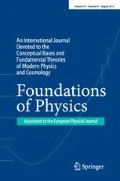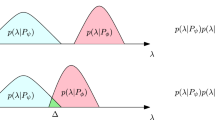Abstract
The ontological model framework for an operational theory has generated much interest in recent years. The debate concerning reality of quantum states has been made more precise in this framework. With the introduction of generalized notion of contextuality in this framework, it has been shown that completely mixed state of a qubit is preparation contextual. Interestingly, this new idea of preparation contextuality has been used to demonstrate nonlocality of some \(\psi \)-epistemic models without any use of Bell’s inequality. In particular, nonlocality of a non maximally \(\psi \)-epistemic model has been demonstrated from preparation contextuality of a maximally mixed qubit and Schrödinger’s steerability of the maximally entangled state of two qubits (Leifer and Maroney, Phys Rev Lett 110:120401, 2013). In this paper, we, show that any mixed state is preparation contextual. We, then, show that nonlocality of any bipartite pure entangled state, with Schmidt rank two, follows from preparation contextuality and steerability provided we impose certain condition on the epistemicity of the underlying ontological model. More interestingly, if the pure entangled state is of Schmidt rank greater than two, its nonlocality follows without any further condition on the epistemicity. Thus our result establishes a stronger connection between nonlocality and preparation contextuality by revealing nonlocality of any bipartite pure entangled states without any use of Bell-type inequality.


Similar content being viewed by others
Notes
In [14], preparation contextuality has been shown for maximally mixed state of a qubit.
The notion of contextuality is discussed more elaborately in the next section.
This theorem states that every representation of a density matrix \(\rho _B\) can be prepared by acting on a different non-interacting system A if A and B share a pure entangled state \(|\psi _{AB}\rangle \) such that \(\rho _B=Tr_{A} (|\psi _{AB}\rangle \langle \psi _{AB}|)\).
The scenario considered by Leifer and Maroney is more relaxed as it requires to satisfy Eq. (30) only for a single pair of \(\psi \) and \(\phi \).
In [22], Maroney has shown that for every quantum state (in Hilbert spaces of dimension greater than two) there exists another quantum state such that the ontic overlap is strictly less than the quantum overlap and hence the ontological model cannot be maximally \(\psi \)-epistemic.
References
Einstein, A., Podolsky, B., Rosen, N.: Can quantum-mechanical description of physical reality be considered complete? Phys. Rev. 47, 777–780 (1935)
Bohr, N.: Can quantum-mechanical description of physical reality be considered complete? Phys. Rev. 48, 696–720 (1935)
Popper, K.R.: In: Bunge, M. (ed.) Quantum Theory and Reality. Springer, Berlin (1967)
Ballentine, L.E.: The statistical interpretation of quantum mechanics. Rev. Mod. Phys. 42, 358–381 (1970)
Peres, A.: What is a state vector? Am. J. Phys. 52, 644–650 (1984)
Caves, C.M., Fuchs, C.A., Schack, R.: Quantum probabilities as Bayesian probabilities. Phys. Rev. A 65, 022305 (2002)
Pusey, M.F., Barrett, J., Rudolph, T.: On the reality of the quantum state. Nat. Phys. 8, 476–478 (2012)
Harrigan, N., Spekkens, R.W.: Einstein, incompleteness, and the epistemic view of quantum states found. Phys. Rev. 40(2), 125–157 (2010)
Bohm, D.: A suggested interpretation of the quantum theory in terms of “Hidden” variables. I. Phys. Rev. 85, 166–179 (1952)
Bohm, D.: A suggested interpretation of the quantum theory in terms of “Hidden” variables. II. Phys. Rev. 85, 180–193 (1952)
Bell, J.S.: On the einstein podolsky rosen paradox. Physics 1(3), 195–200 (1964)
Bell, J.S.: Speakable and Unspeakable In Quantum Mechanics. Cambridge University Press, Cambridge, England (2004)
Kochen, S., Specker, E.P.: The problem of hidden variables in quantum mechanics. J. Math. Mech. 17, 59–87 (1967)
Spekkens, R.W.: Contextuality for preparations, transformations, and unsharp measurements. Phys. Rev. A 71, 052108 (2005)
Leifer, M.S., Maroney, O.J.E.: Maximally epistemic interpretations of the quantum state and contextuality. Phys. Rev. Lett. 110, 120401 (2013)
Gisin, N.: Bell’s inequality holds for all non-product states. Phys. Lett. A 154, 201–202 (1991)
Schrödinger, E.: Discussion of probability relations between separated systems. Proc. Cambridge Philos. Soc. 31, 555–563 (1935)
Schrödinger, E.: Discussion of probability relations between separated systems. Proc. Cambridge Philos. Soc. 32, 446–451 (1936)
Hughston, L.P., Jozsa, R., Wootters, W.K.: A complete classification of quantum ensembles having a given density matrix. Phys. Lett. A 183, 14–18 (1993)
Gisin, N.: Stochastic quantum dynamics and relativity. Helv. Phys. Acta 62, 363–371 (1989)
Aaronson, S., Bouland, A., Chua, L., Lowther, G.: \(\psi \)-epistemic theories: the role of symmetry. Phys. Rev. A 88, 032111 (2013)
Maroney, O. J. E.: How statistical are quantum states? arXiv:1207.6906 (2012).
Harrigan, N., Rudolph, T.: Ontological models and the interpretation of contextuality. arXiv:0709.4266 (2007).
Peres, A.: Two simple proofs of the Kochen–Specker theorem. J. Phys. A: Math. Gen. 24, L175–L178 (1991)
Mermin, N.D.: Hidden variables and the two theorems of John Bell. Rev. Mod. Phys. 65, 803–815 (1993)
Cabello, A., Estebaranz, J.M., Alcaine, G.G.: Bell–Kochen–Specker theorem: a proof with 18 vectors. Phys. Lett. A 212, 183–187 (1996)
Busch, P., Lahti, P.J., Mittelstaedt, P.: The Quantum Theory of Measurement (2nd Chapter). Springer, Berlin (1996)
Cassinelli, G., De Vito, E., Levrero, A.: On the decompositions of a quantum state. J. Math. Anal. Appl. 210, 472–483 (1997)
Wiseman, H.M., Jones, S.J., Doherty, A.C.: Steering, entanglement, nonlocality, and the Einstein–Podolsky–Rosen paradox. Phys. Rev. Lett 98, 140402 (2007)
Cavalcanti, E.G., Jones, S.J., Wiseman, H.M., Reid, M.D.: Experimental criteria for steering and the Einstein–Podolsky–Rosen paradox. Phys. Rev. A. 80, 032112 (2009)
Saunders, D.J., Jones, S.J., Wiseman, H.M., Pryde, G.J.: Experimental EPR-steering using Bell-local states. Nat. Phys. 6, 845–849 (2010)
Leifer, M.S.: Is the quantum state real? A review of-ontology theorems. arXiv:1409.1570 (2014)
Acknowledgments
It is our great pleasure to acknowledge G. Kar for various discussions, suggestions and help in proving the results. M. B. acknowledges private communications with M. S. Leifer about stronger non-maximal \(\psi \)-epistemicity. Discussion with S. Ghosh is gratefully acknowledged. S. K. C. is thankful to the Physics and Applied Mathematics Unit, Indian Statistical Institute, Kolkata where a major part of this work was done when he was visiting the unit. A. M. acknowledges support from the CSIR Project 09/093(0148)/2012-EMR-I. S. K. C. acknowledges support from CSIR, Govt. of India. We also like to thank an anonymous referee for useful suggestions.
Author information
Authors and Affiliations
Corresponding author
Additional information
Recently, M. S. Leifer have written a review on \(\psi \)-ontology theorems [32]. Among many open questions listed in there one is concerned about preparation contextuality proof for any mixed quantum state. This question is addressed in our paper and we have answered affirmatively.
Rights and permissions
About this article
Cite this article
Banik, M., Bhattacharya, S.S., Choudhary, S.K. et al. Ontological Models, Preparation Contextuality and Nonlocality. Found Phys 44, 1230–1244 (2014). https://doi.org/10.1007/s10701-014-9839-4
Received:
Accepted:
Published:
Issue Date:
DOI: https://doi.org/10.1007/s10701-014-9839-4



